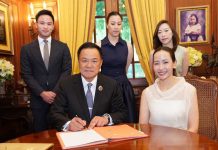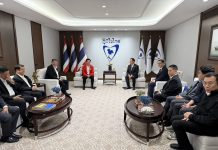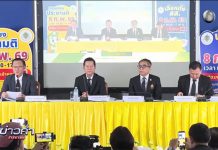The International Court of Justice’s ruling on disputed land surrounding the Phra Viharn Temple on the Thai-Cambodian border on November 11th, 2013 is the interpretation of the 1962 verdict by the same court which declared the temple to be Cambodian, but did not rule on the area around it. Both Thailand and Cambodia have accepted the ICJ’s verdict with calmness, showing satisfaction with the court’s decision. The court this time defined the vicinity of the temple but stressed that it was a “very small portion of territory”. Thailand and Cambodia will from now on have to work together what the exact area is, and the job must be done in good faith as the court had emphasized.
On 11 November 2013 at the Peace Palace in the Hague, Kingdom of the Netherlands, Mr. Surapong Tovichakchaikul, Deputy Prime Minister and Minister of Foreign Affairs, General Yutthasak Sasiprapha, Deputy Minister of Defence, Mr. Virachai Plasai, Ambassador to the Hague, Mr. Nuttavudh Photisaro, Deputy Permanent Secretary for Foreign Affairs, and the Thai delegation attended the reading of the ICJ’s judgment on Cambodia’s request for interpretation of the Court’s 1962 Judgment on the case concerning the Temple of Phra Viharn.
Shortly after the Court delivered its judgment, Deputy Prime Minister and Foreign Minister Surapong commented that the Judgment should be acceptable to both sides. He said that Thailand and Cambodia would discuss the implications of the Judgment under their Joint Commission on Bilateral Cooperation. Ambassador Virachai, and leader of the Thai legal team, summarized the Judgment, saying that the Court found that Cambodia’s request was admissible and ruled that the 1962 Judgment had decided that Cambodia had sovereignty over the promontory of the Temple, an area which is in fact close to alternative Method One considered by the Thai Cabinet in 1962. He also said that the Court did not specify the exact area and instructed Thailand and Cambodia to negotiate in good faith.
Later, the Thai delegation in The Hague had a videoconference with Prime Minister Yingluck Shinawatra and her team at the Government House. The legal working group, headed by Permanent Secretary for Foreign Affairs and comprising high-level officials from relevant agencies and the foreign legal counsels, will study the Judgment in detail and present its recommendations to the Government on the best course of action. However, the exact timeframe for the negotiations with Cambodia is yet to be determined, as Thailand needs to look into legal aspects of the case first. According to Permanent Secretary for Foreign Affairs Sihasak Phuangketkaew the meeting with the legal working group should start in the next couple of weeks.
Foreign Minister Surapong Tovichakchaikul explained from the Netherlands that a Thai-Cambodian Joint Commission will provide a forum for the two countries to settle the issue. Cambodian Foreign Minister Hor Namhong agreed to the plan, Mr Surapong said.
Meanwhile, Prime Minister Yingluck Shinawatra said the Thai troops will not be withdrawn from the disputed area as required by the International Court of Justice until a meeting is held between the Thai and Cambodian governments. The premier said the security personnel will stay put while Thailand awaits a conclusive meeting with the Cambodian side. In its ruling, the ICJ has requested that both nations sort out their differences through peaceful means.
Prime Minister Yingluck reiterated that Thailand will enter negotiations with Cambodia to put an end to the issue. She said the court’s verdict created a win-win situation for both countries and there have been no reports of border fighting as previously anticipated. She added that Thailand will use bilateral negotiation with Cambodia to decide how to proceed after the ICJ’s ruling, adding that the talks will not violate the Thai constitution, but would be in the national interest and the spirit of Asean.




